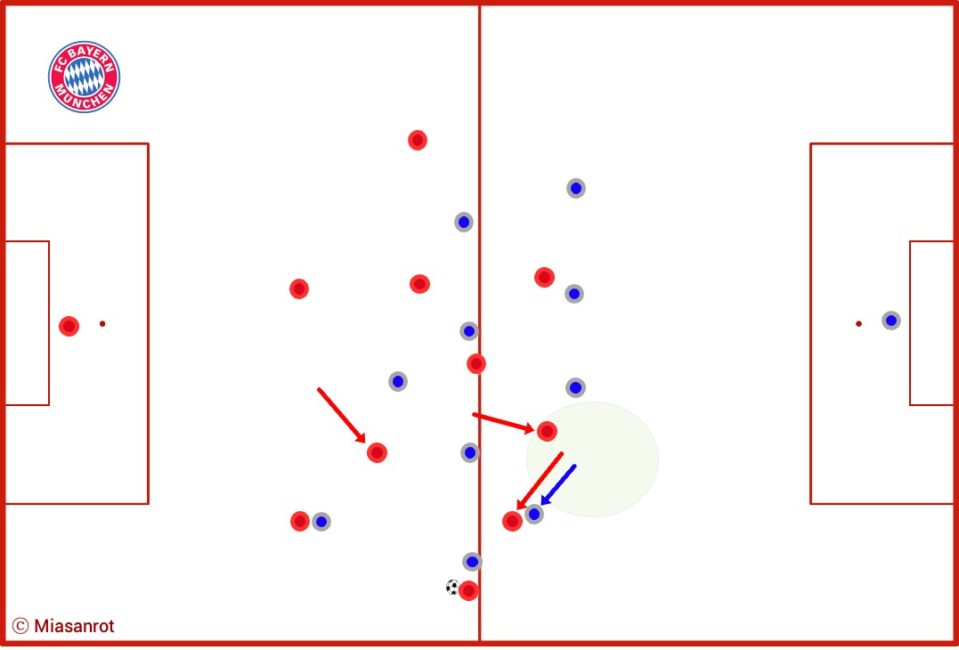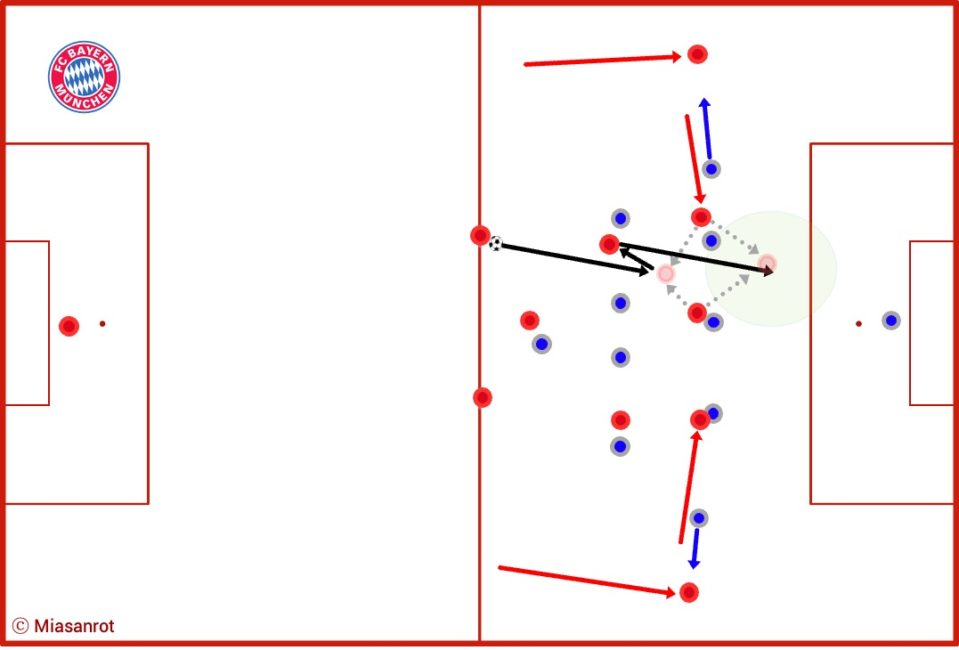MSR awards season 20/21: team of the season
The celebrations after the final whistle against Eintracht Frankfurt last Sunday afternoon showed once again how close this team has become. Perhaps it would not be so wrong, therefore, to limit any analysis of the success factors to just that: team unity. That is why they are our FC Bayern team of the season. Just ahead of the FC Bayern basketball team and well ahead of the men’s football team and the Bayern reserves.
In recent years, the Bayern women have always had a decent squad, but on the field the team looked unbalanced. In the end, they always fell slightly short of expectations because they lacked consistency in the league: the forward play was bumpy, there were hardly any recurring attacking patterns, and defensively they were always susceptible to conceding a goal or two.
This season, however, none of these problems recurred. Bayern marched through the league with ease, built up a run of 26 consecutive wins and ultimately managed to bring their lead over the line despite strong competition from Wolfsburg. An impressive achievement.
Three factors for success
1. Team spirit
To get an idea of how close this team is, just take a look at their posts on social media. On Instagram in particular, the players’ various messages over the course of the season could hardly lead to any other conclusion: They get along quite well with each other off the pitch, too. This harmony is especially evident in the moments when a match reaches a critical state.
Despite their dominance, there were always games in the league in which only one goal decided over victory or draw. Time and again, Bayern came up victorious because they did not collapse after a weak start to the game or a sudden setback mid-game, but remained focused and continued to work together as a unit.
In previous years, there were definitely moments when this focus seemed to be very fragile. Moments that ultimately cost important points in the title race against Wolfsburg. This time however they did not allow external circumstances to sap their confidence in the dying hours of the season despite the title race heating up at the eleventh hour due to an unnecessary defeat against Hoffenheim. The championship is not a success of individual players, but of the entire team.
2. Squad vacancies filled
And yet an analysis limited to such ethereal aspects as team spirit would be too superficial. There have been substantive steps forward regarding squad reinforcements as well. Although with Melanie Leupolz and Verena Schweers two important players and personalities have left the club, Bayern’s sporting management under the leadership of Bianca Rech has been able to make clever signings in the transfer market. Four players deserve special mention: Hanna Glas, Marina Hegering, Sarah Zadrazil and Lea Schüller.
Since Vivianne Miedema left the club in 2017, Bayern have lacked a top-level attacker who not only scores goals reliably but also has the technical quality to get involved in the game. Jovana Damnjanović seemed to develop well in this respect last season, but then suffered a serious injury. This season, however, Lea Schüller came on board as a young attacker. She was able to shine quickly, needing only a short bedding in period. In the last 11 Bundesliga games, the 23-year-old scored 14 times, collecting a total of 16 goals. However, Schüller cannot be reduced to her prolific goal scoring alone. She works very disciplined for the team with and without the ball and is not only a traditional striker, but also creates spaces for the wingers.
The team was also strengthened considerably in the right-back position. Hanna Glas is a player whose potential added value for the team many found difficult to gauge before the season. Since then she has showed that she has enormous value for the team. Above all, her composure on the ball and her usually reliable decision-making under pressure help Jens Scheuer’s team massively. Glass is difficult to press and her passing is a great asset during build-up play. Offensively, she also takes a very active part in the game. Not only her eye-catching goal in the first leg against Chelsea as well as the assist for Sydney Lohmann in the same game are representative of this, but also her many small forays forward, which always asked difficult questions of the opposing defensive line.
Flying below the radar at times is Sarah Zadrazil. But the Austrian has filled a need in midfield that was deemed huge before the season. Melanie Leupolz had left Munich for London, where she now ties her boots for Chelsea WFC. The former Bayern captain was the lynchpin in midfield. Now, Lina Magull was able to compensate well for her departure. But that is only half the truth. Magull and Lohmann have so much freedom to act because Zadrazil does such an outstanding job next to them. She is the perfect link-up player, fills the holes in midfield and is robust and strong without the ball.
Another important reinforcement for the starting eleven was certainly Marina Hegering. But also beyond that, FC Bayern’s sporting management has done many things right. Klara Bühl and Viviane Asseyi were always part of the starting eleven or able to make an impact from the bench. With last summer’s transfer window, Scheuer’s team has become much stronger, especially technically, which shows in everyday Bundesliga life where speed and creativity are invaluable assets in penetrating against deep defensive lines. Both were added in the transfer summer. All in all, Bayern’s squad planning was more than satisfactory across the board.
3. Tactical progress
Last but not least, the coach deserves a lot of credit for the successful season too. Jens Scheuer’s start to the season was accompanied with criticism as a result of the previous season’s performances. His team often seemed despondent in big games and too often not creative enough in everyday Bundesliga life. This season, there was definitely great progress on this front, especially in terms of creativity.
One of Bayern’s tactical devices that had been used far too rarely in previous years was pass and move combinations during forward play. Especially in the attacking third, Bayern’s play has become significantly more dynamic. The players now change positions, draw opponents out of their positions more efficiently, and offer more passing options close to the ball.

A recurring pattern here is that the opposing players are drawn out wide in order to open spaces in the center that the Bayern players can then use through the technically strong players Hegering and Magull. Similarly, the Bayern players frequently open up spaces in the attacking third through opposing runs, which helps stretch the opposing defensive line and create openings.

And even against deep sitting teams that were difficult to carve open there were always solutions that looked rehearsed. It was noticeable that the Bayern women were able to combine more often through the middle than in the previous year. The wingers often tucked in so that there was another passing option in the center. This meant that the center-forward could either drop off to offer herself for a pass in the space between the lines or make a deep run while the winger made herself available between the lines. In order to prevent the opposing back line from adjusting too easily, Scheuer sometimes deployed his full-backs very high, particularly on the near side of the ball. This added dynamic in the center of the pitch added more variability to the game.
All in all, Bayern’s passing game was more stable than last season. One of the most important keys, however, might have been the improved work ethic without the ball. Despite the high risk in attack, the Bayern women could mostly rely on their strong defense. Their protection against counter-attacks was also good because a lot could be nipped in the bud. The Bayern women’s pressing was outstanding in national comparison. Up front, the attackers usually covered the spaces so that the opponents had to build up either via the full-backs or play the ball directly into the center of midfield. There, Zadrazil and Magull in particular were always ready to pounce and due to their dueling strength and presence of mind able to create an immediate threat on the counter-attack.
Things that can still be improved
1. More courage in possession under pressure
However, there are also areas that still need improving. Especially in the games against Wolfsburg and Chelsea, it was evident that Bayern are prone to make mistakes under pressure. They preferred to hit long balls forward rather than trusting in their technical abilities. Sometimes a long ball is necessary to relieve pressure or to overcome a high defensive line. But especially in the cup defeat in Wolfsburg, the reverse fixture in the Bundesliga against the same team, and the two games against Chelsea, there were too many long balls. As a result, Bayern lost control of the game and allowed their opponents to gain superiority.
Hegering, Zadrazil, Magull, Lohmann, and from next season even Saki Kumagai – that is quality at a very high level in the center. Based on this quality the team has to be able to move the ball around and make the opponents run when the pressure increases. Doing so saves energy and saps the energy of the other team. A look at the current Champions League winners can do no harm. Barcelona showed in an impressive way how important a clean short passing game and positional play are. Scheuer and his team still have some room for improvement here.
2. The left-back position
In terms of squad planning, Bayern could take a second look at improving in the left-back position. Carolin Simon is an extremely reliable player at Bundesliga level who possesses a decent combinational play and does a competent job at the back. With the club’s increased demands, however, it could happen that she will soon reach her limits. She is certainly not a player of Glas’s calibre.
Especially in the second leg against Chelsea in the Champions League semi-final, coach Emma Hayes had identified Simon’s side as Bayern’s weak spot. On the one hand, Scheuer’s four-man backline played into this plan, on the other hand, Simon was very much out of her depth playing against the class of Fran Kirby. At this level, it just was not enough.
3. Confidence in one’s tactics
It is all too understandable that Bayern did not want to commit naked suicide against Chelsea or last year against Lyon. But Scheuer could not really shake off his reputation of being a very cautious coach this season. Perhaps too cautious? By winning the title, he has earned the credit to prove his detractors wrong in the coming months.
The quality in the squad is enormous, and even though they are just beginning to gain important experience and grow from it, there were moments when Scheuer’s tactical approach seemed to inhibit the team rather than help it. Against Wolfsburg and Chelsea, Bayern were too passive and defensive at times. Instead of trusting in what actually makes them strong, they sometimes got lost in a wait-and-see attitude.
This is where Scheuer must start in the coming season. The Bayern women were at their best against top teams when they trusted in their ability to build up pressure. In the first leg, Chelsea hardly had any good chances, mainly because Bayern put on a brave midfield pressing in phases and did not just wait for the Blues back at their own penalty area. Scheuer attaches a lot of importance to a stable defense, but he might not want to focus too much on the defensive aspect of the game in the future if they want to take another step forward in Europe.









